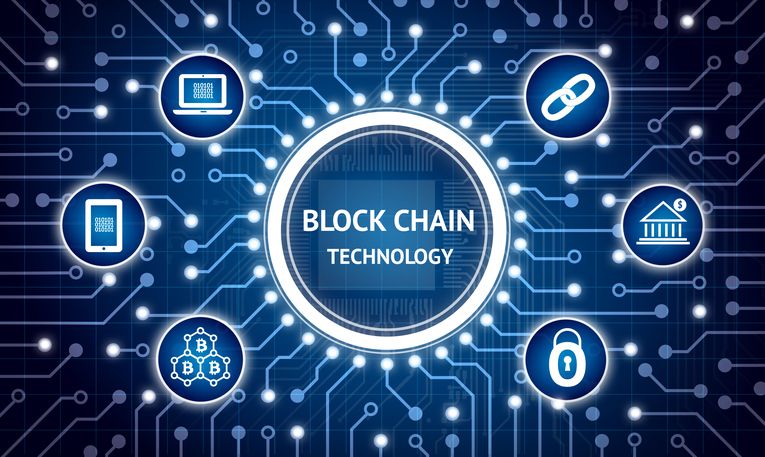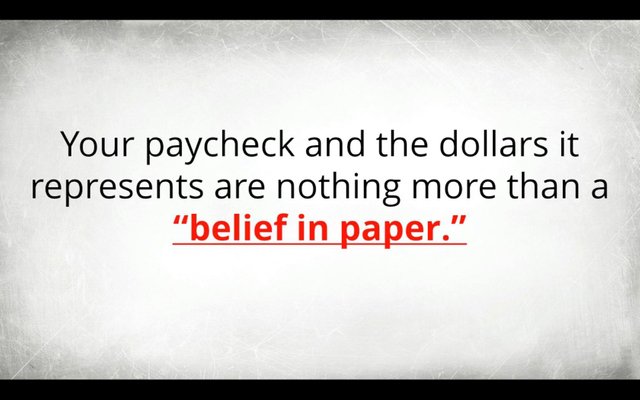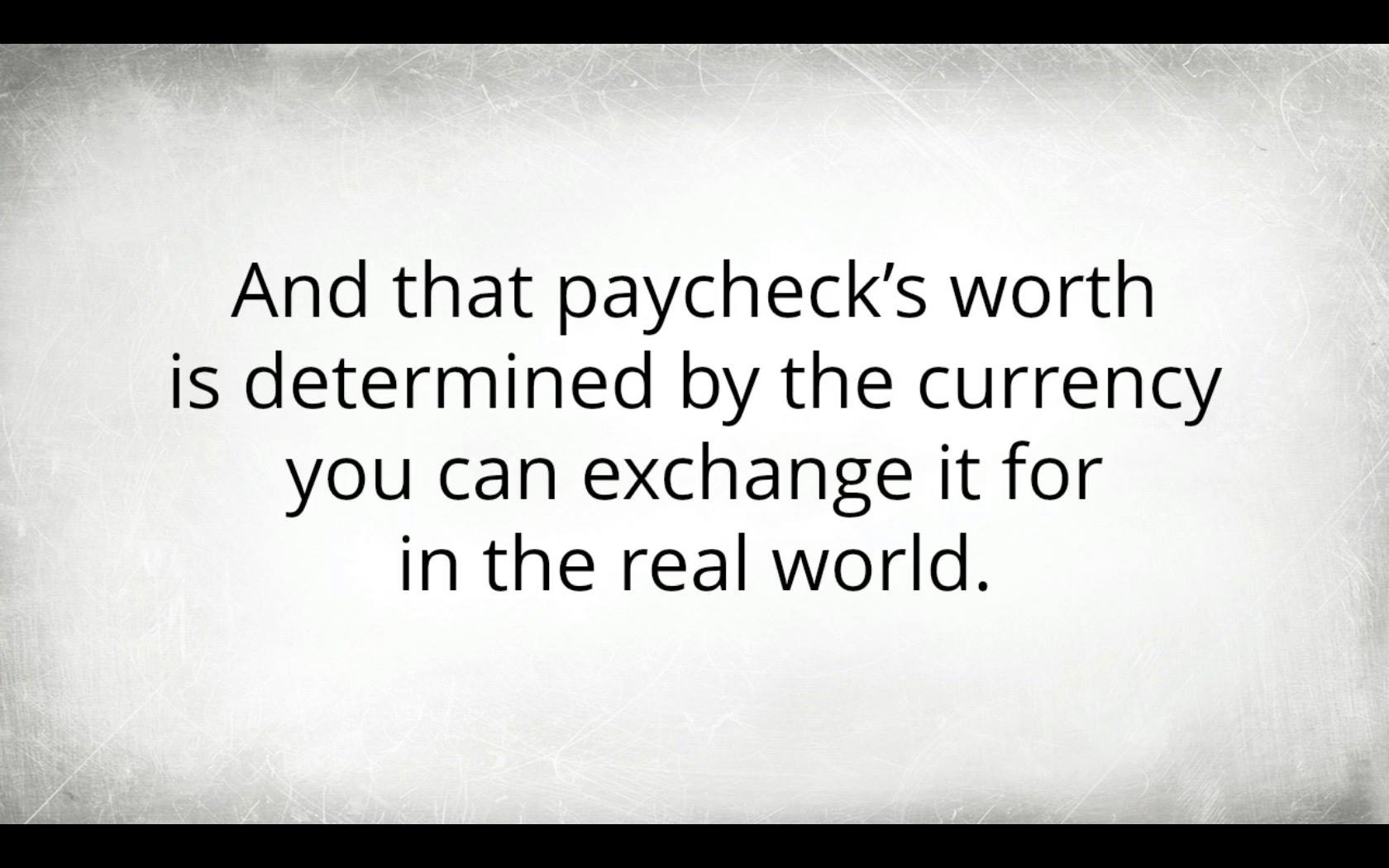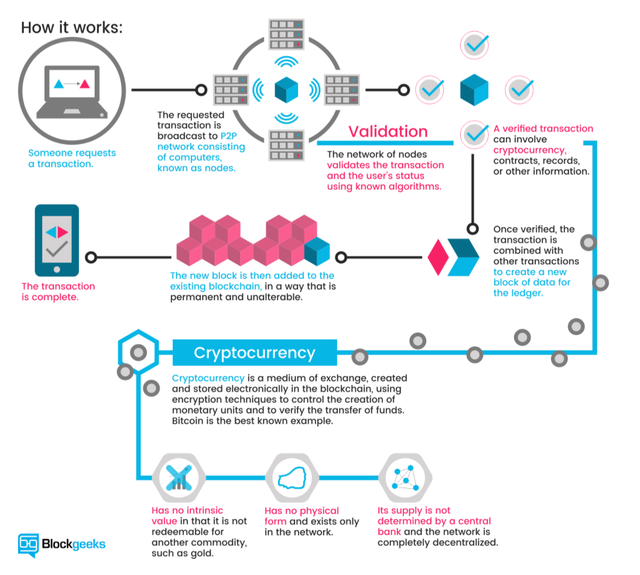#MONEY - Is Blockchain the Way of the Future?: Thoughts on Cryptocurrency | SOL 147
#MONEY - Is Blockchain the Way of the Future?: Personal thoughts on Cryptocurrency, Blockchain, and the future of value | SOL 147
Part II

Source
[<< Part I]
Disclaimer: I am not an economics expert nor consultant on the subject of Economics, financial or otherwise, nor can I legally dispense such information as "advice" or prophecy. The thoughts expressed in this article represent my own personal views and take sole responsibility for all ideas illustrated here.
Blockchain that!
The blockchain is the essence of value for the cryptocurrency token, carrying with it the entire future of cybersecurity and data theory. An automatic, adaptive, dynamic record of transaction history, or ledger, indelibly written in binary codes, account with 100% certainty the value of exchange at the very time/space it happens.
@thescubageek said:
Put it on the blockchain indeed! Having public access to this timestamp data gives an awesome layer of transparency into the platform -- everyone knows when a change has been made.
Let's welcome cryptocurrencies based on blockchain technology, no longer an erroneous process of assessing value in labor, but value now defined by labor. The work is all that shows on the blockchain. The blockchain proofs several concepts crucial in computer logic to make certain a token's value has integrity and stability. Cryptocurrencies use various timestamping schemes to avoid the need for a trusted third party to timestamp transactions added to the blockchain ledger. The first timestamping scheme invented was the proof-of-work scheme. The most widely used proof-of-work schemes are based on SHA-256 and scrypt.
A proof-of-work (PoW) system (or protocol, or function) is an economic measure to deter denial of service attacks and other service abuses such as spam on a network by requiring some work from the service requester, usually meaning processing time by a computer. Proof-of-work is a concept blockchain technology has pioneered by use of computer logic code to make certain information that is input to the ledger is actually from its author, not an algorithm. This is one of several methods programmers have been able to asset value to a token, by its users, as direct shareholders to the collective wealth pool. As the pool grows, each successful entry rewards the sender with more tokens, incrementally fluctuating in proportion to the rate of investments buying, selling, and trading various tokens.
Proof of stake (PoS) is a type of algorithm by which a cryptocurrency blockchain network aims to achieve distributed consensus. In PoS-based cryptocurrencies, the creator of the next block is chosen via various combinations of random selection and wealth or age (i.e., the stake). In contrast, the algorithm of proof-of-work-based cryptocurrencies such as bitcoin uses mining; that is, the solving of computationally intensive puzzles to validate transactions and create new blocks.
There's an incredible amount of data here when you start cross-referencing all the information -- financial trends, account engagement, whale activity, etc. The @steemsmarter project has a lot of cool stuff in development around these areas and I look forward to sharing it with the Steem community soon.

Data is the new Demand.
Blockchain creates an entry of each and every edit, addition, subtraction, and transaction to the ledger record by the very network that supplants its information. This system of cryptographic authentication entrusts the information as 100% true in accordance to fact. If we consider the old paradigm, time = money, we must work for money and the time it takes to make money requires work (read: labor). How labor is defined around the world justifies the concept of value, relative to the ways and means to create a product of that time or to serve a result progressed over time.

"Money, however is only one possible application of blockchain technology. The potential for growth is enormous. With blockchain we can record transactions of any kind: verify agreements, identity, authenticity and automate processes that require manual authentication."
If it hasn't been overstated at this point, mining cryptocurrency to mitigate large data crunching operations is a no-brainer passive income stream. While servers are calculating huge metric data, of populations, migration patterns, analyzing genetic anomalies, the movement of celestial bodies over great amounts of time, why not have solutions-driven protocols mine token coin rewards to the hundreds of scientists, writers, and technicians inputting their studies towards funding the project with the research itself?
"With Blockchain, financial fraud is now impossible to achieve as the information stored in blocks is open and available for everyone. No one can really cheat the system by editing records as everyone else is watching."
"Trade has become more and more complex through the centuries. Nowadays, most of the transactions are being recorded in a form of bookkeeping. The information on trade transactions is mostly perceived as confidential and kept in hands of one or several entities. Therefore, in order to make transaction traders are relying on third parties as facilitators of the transactions. Traditionally, in order to make a financial transfer, we do not see another way than asking a bank to facilitate it."
Information is about supply.
For example, healthcare and medical information systems come to my mind. Mining operations can retail their server processing power (STEEM power delegation) to a billing processor or file archive (Steem Dollar Token), to encrypt patient data inputs to a remote storage, and patient authorizes inputs with biometric private key access. I can't help but figure that capitalism/consumerism would be replaced with kind of gamified techno-conservatism aimed at energy efficiency in every factor.
Hospitals using blockchain technology can use mining operations as energy converters, that transform data into energy credits. Files are securely transmitted to data processing cells, through virtual LAN networks, remote server networks that encrypt passive input data into packet submissions to a blockchain ledger. This medical network blockchain would be accessible by smart contract based, self-executing applications, similar to Ethereum's Dapps, and manifest its own value token for every entry/egress. The blockchain can interpolate patient biometric information without having to actually handle the data, the patient would be directly connected to the blockchain by a form of biometric signature to activate a private key implanted into the person's body (possibly through an array of sensors and vital organ monitors.) Patients can live their lives fully, without much intervention, and the role of doctors, physicians, and medical workers can intelligently dispense medial council with incredible accuracy, with AI-based advisory, all instantaneous access to real-time information from anywhere in the world.
Wisdom is the most valuable resource.
Instead of working for money, your work would create money.
Every form of expression could have an intrinsic "weight", perhaps an index closely bound by the amount of caloric energy required for a physical activity or measure of electric power to deliver results of an automated process. A.I would allow rapid access and interpolation of data in real-time, as increasingly sophisticated interfaces, like VR, blur the realm of the Internet into immersive digital collaborative creative communities.
Data, in this case, is money created from work. In the future, all data will self-assign its value directly proportional to the systems that rely on its use; smart contracts issue micropayments along every instance along the blockchain, while future iterations to the agreement refer to each previous version and splits the record further into its own blockchain record, the ledger updates instantaneously when forks occur. Forks would then represent an augment upon the original state of value for said token, without disrupting the original ledger, rather append to the record, surplus to a broader pool of data points that future entries can infer to.

Yeah mate, blockchain is changing the world !
¥€$ 🙌🏾
I truly believe in the power of Blockchain technology. Steem helps build the bridge! #ImSteeminOnSteemit more than I used to on those other sites, they stopped paying me for my valuable content. Blockchain will fund the future of information, data logic, and flash forward us to a true knowledge-based global economy. Only time will tell, but cryptocurrency and blockchain are here to stay.
Feel free to connect with me here or on Instagram @nightstarskywalker for more news and updates as they're published
Thank you for your support!
Time is Art. In Life, all we have is Time. Why not make Art all the Time?
I am a proud @earthnation Steemit Guild Community member!
Thanks to their loyal support, I am able to create a passive income stream that funds my creative output and delivers this original content directly to YOU.
This post used the @earthnation tag.
Earth Nation is a Planetary Alliance of cooperative businesses and humanitarian organizations creating decentralized/ethical alternatives.
Into new paradigm, conscious focused, humanitarian, spiritual, or pro-active solutions?
Join like-minded souls and let's build a better world.
Visit: http://earthnation.world